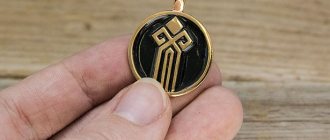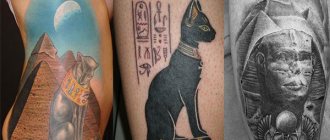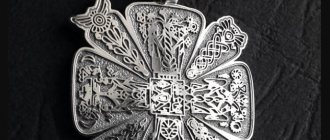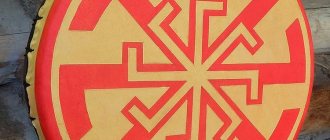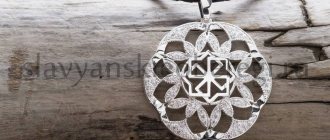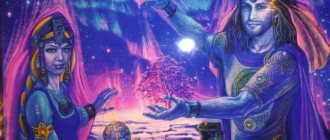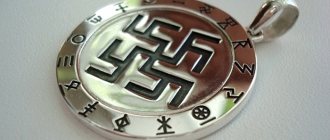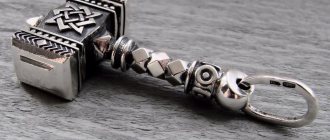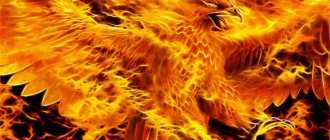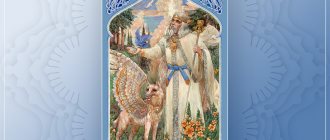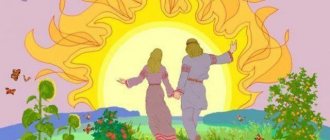07.29.2020 Euphrosynus of Pskov Religion
The spread of different versions of Slavic neo-paganism in recent years has made such a character in Slavic mythology as a god named Rod quite popular. We will talk about who this is and what role the god Rod plays among the Slavs in this article.
About the supremacy of the Family
Sometimes they say that the god Rod is the supreme god among the Slavic peoples. This is not entirely true. The supreme one among others is Perun. Sometimes this place is also adopted by Svarog, the father of Perun. But whoever is higher among the rest, his supremacy emphasizes his difference from other gods. Therefore, Svarog is not Perun, and Perun is not Veles, and so on. The genus is the deity that overcomes all differentiations within itself. In other words, the Russian god Rod is a collective image, a personification of the completeness of everything. All other gods, as well as the whole world, are only private manifestations of the Family. Therefore, he is not the supreme god, but the god who is the source of divinity, the source of all things - he is above any hierarchy. Conventionally, we can call him a supra-supreme god, emphasizing his independence from the principle of hierarchy and his superiority over it.
God Rod
Without a doubt, the most famous and powerful god of the Slavic pantheon is Rod. He is the god of gods, the father and creator of all things. He created the whole world as we know it, with continents and oceans, forests and mountains, rivers and fields, birds and animals, people and insects. He also created all the older gods, later becoming the father of many of the younger ones. Of course, our ancestors’ attitude towards the creator of everything that exists could not be disrespectful or frivolous. Surprisingly, not a single Slavic tribe in cities, villages or villages had idols depicting Rod, while idols of Perun, Veles, Stribog, Dazhdbog and Mokosh were found everywhere. Most likely, this is due to the fact that Rod is everything, but at the same time cannot have a specific appearance, unlike other gods. An illustration of Rod’s high esteem is the fact that in the Russian language many dozens of words come from his name. SPRING, nature, ROD, RELATIVES, people and many others. Almost all of these words have a good meaning. The spring provides the purest, life-giving moisture. Relatives are always ready to defend and help in any situation. For any Slav, the clan in general was and should remain one of the highest values - a family of parents and children, as well as grandparents, grandchildren and granddaughters, like links in one chain, should continue indefinitely. Above the clan, only the people stand - the highest value for whose benefit one can kill without pity and die without fear. It can be assumed that the term itself came from a simple combination of gender. That is, keeping to the family. And indeed, thousands, hundreds of thousands, millions of clans make up one powerful people. The more closely members of clans realize their connection, the stronger and more invincible the entire people will be. Rod is often closely associated with women in labor. There is a version that these are Dolya and Nedolya - goddesses of fate. But much more plausible is another version that our ancestors called Lada and Lelya, Rod’s wife and daughter, Rozhanitsy. Most likely, in realizing the high importance of the Family and Women in Birth, one can consider the fact that our ancestors also understood the importance of prolonging the family line. There will be no numerous children and the family line will be interrupted. And this was considered the most terrible curse and punishment for terrible sins. The clan itself was protection and support in the most dangerous and difficult times. The term “degenerate” means that a person is deprived of the intercession of his family for terrible crimes. Father, son, brother will never extend their hand to him. This means that a person is doomed to death. They remembered Rod at all holidays and feasts, because he is always and everywhere present. But especially the holiday of Rod and Rozhanitsa was celebrated on September 9. Later, after the arrival of Orthodoxy in Rus', this holiday was distorted and declared the birthday of the Mother of God. But still, even centuries after the adoption of Christianity, our ancestors did not forget their roots. The first, morning feast was held in honor of the Mother of God. But at the second meal, Rod was always revered, who created the earth, all the plants and animals on it, allowing us to celebrate the harvest festival every year, rejoicing at the end of summer work, full bins providing food for the whole year. It is difficult and almost impossible to understand and comprehend Rod, as well as to embrace the immensity. However, a true Slav does not need this. It is enough for him to know and remember that Rod accompanies and supports the worthy always, everywhere and in everything. Another version that describes the Slavic God Rod. The clan is the patron of each Clan of the Great Race, as well as the vast Universe of the World of Rule .
Speaking about our Ancestors-Forefathers - Great-Grandfathers, Grandfathers and Fathers, we say that this is our Family. We turn to the Family, seeking support from the Gods and Ancestors, because our Gods are our Fathers, and we are their children.
Rod is the patron god of the palace of the Stork (Busla) in the Svarozh Circle.
AZ – God living on Earth, Man-Descendant of the Heavenly Family. The Slavic-Russians were not created or created in someone else’s image and likeness - they are simply part of the God of the Family himself. God Rod appeared in our world at the very beginning of time - He came out of a golden egg laid by the Golden Universal Duck. Then God Rod created himself a partner, the Mother Goddess Lada. From their connection, numerous children-Gods appeared, who assisted their Parent in the creation of the Most Pure Svarga. So, God Svarog created (bungled) the Universal Svarga, and God Veles brought it into constant motion. Then other children of Rod and Lada, their descendants and the descendants of their children began to appear in the World. This has been going on for a very long time, as long as our light exists. Now we ourselves are turning into Gods, into descendants of the God of the Family. Only now we ourselves create our own Family, and our God - the Heavenly Family, we glorify and worship him as our Great Ancestor-Parent.
Buy an idol of God Rod!
Description of Rod in modern neo-paganism
Theological research of modern neo-pagans of the Slavic version usually comes down to the assertion that Rod is the most ancient god. The genus is the creator and maker of the world, which makes it similar to the image of the Creator in orthodox Christianity. However, the pagans themselves, like Christians, tend to vehemently deny this identity. The god clan among the Slavs was also considered the progenitor of the first generation of deities, called the gods-fathers. He is the cause of all causes, the founder of the universe, the primary creative force, the first thought and sources of everything. The genus is infinite and transcends the concepts of time and space. Pagans, speaking about Rod, also remember a certain world egg - a symbol of the primary world, common to many cultures.
It is believed that before its manifestation in the act of creation, the Rod resided in a certain world egg, surpassing the limits of the material world. This egg is a symbol of the nascent world, nurtured by divine power. When the egg splits, the world emerges from it - heaven and earth. It is also believed that outside the Family there is no existence, as well as non-existence. In other words, the god Rod is omnipresent and timeless. And everything that can be thought resides in it. And there is nothing that surpasses it or is separated from it.
LiveInternetLiveInternet
ROD IS THE SUPREME RUSSIAN GOD. WIFE OF THE KIND and SUPREME GODDESS LADA.
RUS IS THE SON OF THE CLAN and LADA IS THE FATHER OF THE RUSSIAN PEOPLE!
Rod is a Slavic god, the creator of the world and the father of the first generation of light gods (gods-fathers), the Cause of all Causes, the founder and essence of the universe. This is a living thought, creating and creating, endless in space and time. The Slavs believed that initially the Rod was inside the World Egg, a certain space-time unit lying beyond the boundaries of existence. Although, strictly speaking, there was no existence before Rod. And there was no non-existence either. Rod created everything that exists, light and darkness. “He gave birth,” as our ancestors said, hence the name of this great god.
The one god Rod created the world as we know it. He created the sky, earth, mountains and rivers. Populated it all with animals, fish and insects. The clan divided the world into three parts: Prav (the world in which his children, the gods, lived), Yav (the ground world, which was inhabited by animals, and then people) and Nav (the world of the dead, in which, according to some interpretations of ancient legends, Pekelnoye was located kingdom, stronghold of darkness). The clan planted the World Tree (Oak), which covered the upper world with its crown, permeated the earthly world with its trunk, and went deep into the underground world with its roots. From the breath of Rod, the goddess of love Lada appeared, who in her earthly incarnation (the bird Sva) flew around the world and conveyed the will of Rod to all living things. During the creation of the world, the great-goddesses Dolya and Nedolya also appeared, who later, together with Makosh, would weave the threads of divine and human destinies (according to another version, Dolya and Nedolya were born gods much later).
All was well in the world. But it was somehow disordered, because there was no one to follow the laws of this world. And then the single god Rod created Svarog, the great blacksmith god, who forged steel chains connecting all the elements of the universe. So orderliness came to the world, and Rod could calmly rest on the wrong side of the Universe. Svarog, thus, being the first and only son of Rod, completed his creation.
Also, together with the Slavic god Rod, certain female deities - women in labor - are sometimes mentioned. Some researchers believe that women in labor can be understood as the goddesses Lada and Lelya, and possibly Zhiva.
Our ancestors have revered the family since ancient times. This god was considered the progenitor of everything, being and non-being, he alone embodied the entire diverse and diverse world. That is why all the most important words in the Russian language (Motherland, native, nature) come from the name of this god. The Slavs also called the smallest structural units of their society - clans - by the name of Rod. By the way, the word “freak” among the Slavs did not mean at all what we are accustomed to mean by it. Freak - meant the firstborn, the first child in the family, the person standing at the source of the family. And the Slavs called a stupid and scary person a degenerate.
In fact, Rod is the oldest archetype of a single and immortal Creator in space and time, who created the entire inhabited world, from the earth to the stars.
We do not know the exact number of Gods. In the 1000 years since the baptism of Rus', much has been forgotten or lost. And because of the differences in pronunciation and terms of different Slavic dialects, it is difficult to say whether this or that name is just a synonym or whether it is a special, separate Deity. It is reliably known about the existence of at least Svarog, Lada, Stribog, Semargl, Perun, Veles, Mokosh, Doli, Nedoli, Dazhbog, Yaril, Kupala, Khors. The existence of Rod, Triglav, Sventovit, Belbog, Chernobog and Mother Cheese of the Earth as separate Deities has not been reliably confirmed and is still disputed. Since Rod, in many sources, is understood not as a “person,” but as a “family.” Those. when worshiping the Rod, they worship the “family of Slavic Gods”, the “Slavic (on) Rod”. Triglav is also often understood not as a separate deity, but as a trinity of Gods united according to some characteristic. Sventovit and Belobog are often perceived as different names of one God, i.e. in the west he is called Sventovit, and in the east Belobog. And the very existence of Belobog and Chernobog is in question. There is an opinion, based on the fact that before the 12th century there is no mention of these Deities, that Belobog and Chernobog appeared during dual faith, under the influence of Christianity. Since during this period, Rodnoverie and Christianity existed in parallel and adopted certain qualities of each other. In Rodnoverie, initially there was no clear division into black or white, good and evil. At the very least, we have no facts to prove otherwise. And the appearance of Chernobog and Belobog is a consequence of the adoption of this duality by Rodnoverie from Christianity. Mother of Cheese Earth is often understood as another name of the goddess Mokosh. Now we will try to consider each God in more detail and indicate the sources of knowledge about them: Historical sources mentioning the Gods: Veles - “Tale of Bygone Years”: under 6415 (907) “... and his men, according to the Russian law, swore by their weapons, and by Perun, their god , and Volos, the god of cattle, and established the world" Perun - "The Tale of Bygone Years": under 6415 (907) "... and his men, according to the Russian law, swore by their weapons, and Perun, their god, and Volos, the god of cattle, and established the world" - "The Tale of Bygone Years": under 6488 (980) "...And Volodymer began to reign in Kiev alone. And place the idols on the hill outside the castle courtyard: Perun is wooden, and his head is silver, and his head is gold, and Khursa, Dazhb’a and Strib’a, and Smargla, and Makosh.” — In teachings against paganism (Chronicle of Russian Literature and Antiquity, vol. IV, 89, 92, 97, 107): “and she approached the idol and began to eat lightning and thunder, and the sun and the moon, and friends Pereun, Khours, pitchforks and Mokosha , we rely on the guardians, who are called distant sisters, and others believe in Svarozhitsa” Svarog - “Ipatiev Chronicle”, 1114: “they pray to the fire of Svarozhich, and to the garlic - to God, and they create it - whenever there is a feast for whom, then they put them in buckets and cups, and drink about their idols, having fun no worse than heretics” - In the chronicle of John Malala (XII century): “The same Theosta law established that wives should commit violence for one husband... and those who commit adultery, you commanded to execute, For this reason, the god is also nicknamed Svarog... and therefore his royal son, named the Sun, is called Dazhbog.” — In teachings against paganism (Chronicle of Russian Literature and Antiquity, vol. IV, 89, 92, 97, 107): “and she approached the idol and began to eat lightning and thunder, and the sun and the moon, and friends Pereun, Khours, pitchforks and Mokosha , we upirem and guardians, they are also called distant sisters, and others believe in Svarozhitets" Stribog - "The Tale of Igor's Campaign": "Behold the winds, Stribozhi in the air, blow arrows from the sea on Igor's brave regiments" - "The Tale of Bygone Years": under 6488 (980) “...And Volodymer began to reign alone in Kiev. And place the idols on the hill outside the castle courtyard: Perun is wooden, and his head is silver, and his head is gold, and Khursa, Dazhb’a and Strib’a, and Smargla, and Makosh.” - “Chronicle of Russian Literature and Antiquity” vol. IV, 99, 108-9: “to eat the idol sacrifice... they believe in Stribog, Dazhdbog and Pereplut, who is spinning around to drink in the roses” Dazhbog - “The Tale of Igor’s Campaign”: “Then under Olza Gorislavlichi is sowing and spreading strife, destroying the life of Dazhdbozh’s grandson, and in the princely sedition, the people of the world have shrunk” - “Tale of Bygone Years”: under 6488 (980) “...And Volodymer began to reign alone in Kiev. And place the idols on the hill outside the castle courtyard: Perun is wooden, and his head is silver, and his head is gold, and Khursa, Dazhb’a and Strib’a, and Smargla, and Makosh.” — In the chronicle of John Malala (XII century): “The same Theosta established the law that wives should commit sexual assault for one husband... and those who commit adultery should be executed, for this reason he was nicknamed the god Svarog... and therefore his royal son, named the Sun, will call him Dazhbog." - “Chronicle of Russian Literature and Antiquity” vol. IV, 99, 108-9: “to eat the idol sacrifice... they believe in Stribog, Dazhdbog and Pereplut, who also twirled around him to drink in the roses” Khors - In teachings against paganism (Chronicle of Russian Literature and Antiquity t .IV, 89, 92, 97, 107): “and proceeded to the idol and began to eat lightning and thunder, and the sun and the moon, and the friends of Pereun, Khours, pitchforks and Mokosha, we rested and the shores, who are also called distant sisters, and others They believe in Svarozhitsa” - “The Tale of Bygone Years”: under 6488 (980) “...And Volodymer began to reign in Kiev alone. And place the idols on the hill outside the castle courtyard: Perun is wooden, and his head is silver, and his head is gold, and Khursa, Dazhb’a and Strib’a, and Smargla, and Makosh.” - “The Tale of Igor’s Campaign”: “Vseslav the prince judged the people, stood alongside the cities as princes, and prowled the night like a wolf; from Kiev you have crossed the path to the chickens of Tmutorokan, you have covered the path of the great Khorso and the wolf.” Makosh - “The Lay of Idols” of the 15th century: “I demand they put and create... Mokosh’s wonders... They anoint the goddess Ekatia, they create this maiden and honor Mokosh.” - “The Tale of Bygone Years”: under 6488 (980) “...And Volodymer began to reign as one in Kiev. And place the idols on the hill outside the castle courtyard: Perun is wooden, and his head is silver, and his head is gold, and Khursa, Dazhb’a and Strib’a, and Smargla, and Makosh.” — In teachings against paganism (Chronicle of Russian Literature and Antiquity, vol. IV, 89, 92, 97, 107): “and she approached the idol and began to eat lightning and thunder, and the sun and the moon, and friends Pereun, Khours, pitchforks and Mokosha , upirem and berehynyam, they are also called distant sisters, and others believe in Svarozhitsa.” Briefly about the Gods: Veles He is also often called Volos, very often he is contrasted with Perun, as his rival, most likely, this is the reason why Vladimir did not put his idol at the same temple, so that there would be no rivalry between them, and each would do his own thing. The patron of livestock and domestic animals, apparently, this is precisely what explains the place for his temple; it was located near the trading areas, somewhere closer to the pier (in the place where the largest amount of livestock from traders accumulated). Cattle have always been considered a symbol of prosperity, and therefore there was no point for traders to go to the mountain, which is why the temple stood next to them. Prince Svyatoslav mentioned in his oath: “If they betray Perun, let them be cut off by their own weapons, if they betray Volos, let them turn yellow like gold.” This means that, to some extent, Veles was not only the “cattle god”, but also the patron of merchants, and therefore the god of gold and prosperity. Mention of him is also found in the Tale of Bygone Years: “And swearing by his weapon and by his god Perun and by Volos the bestial god...”. A.N. Veselovsky connects his name with the Baltic words wilis, wilci - deceased and dead, interpreting it in this way: the afterlife is a pasture, and Veles is the shepherd of their souls. The rituals of sacrificing some animals as funeral sacrifices are also associated with this. There, the Baltic peoples revered a certain deity Vielon. On the day of remembrance of the dead, they slaughtered a pig and invited this deity to the table, and after the meal they burned pork bones. After baptism, the responsibilities of Veles passed to Nicholas the Wonderworker and he already became the patron of the same livestock, those who walk on the sea, in particular merchants. To this day he is the most revered saint. Perun was considered the patron saint of princes and warriors, defenders. First found in The Tale of Bygone Years 907: “Oleg and his men were taken in an oath according to Russian law, and they swore by their weapons and Perun, their god, and Volos, the god of cattle, and established peace.” After which Igor swore before him: “Igor called the ambassadors, and came to the hill where Perun stood,” Svyatoslav: “If we do not comply with any of what was said before, let me and those who are with me and under me be cursed by the god in whom we believe - from Perun and Volos.” Well, Vladimir also revered him for the time being, until he decided to baptize Rus' with fire and sword. Perun, almost like Zeus, commanded thunder and lightning. He was armed with a club, bow and arrows, and an axe. There is more than one etymological mention of this in the form of names (Belarus. Pärun, lit. Perkūnas, Latvian. Pērkons, Indo-European Parjanya). And also in many languages it has been preserved to this day in the form of national ritual sayings: in the Belarusian language “Nyahai myane pyarun zabie!”, in Western Ukraine the curse: “God butted you Perun!”, and a Polish feast is not complete without the expression : “A kto z nami nie wypije, niech go Piorun trzasne” (the word piorun is still translated from Polish as “lightning strike”). Svarog Svarog is the father of Dazhdbog. In the chronicle of John Malala (XII century): “The same Theosta law established that wives should commit sexual assault for one husband... and those who commit adultery should be executed, for this reason you were nicknamed the god Svarog... and therefore his royal son, named the Sun, is called Dazhbog " There are several versions: 1) Svarog from Sanskrit. svarga "sky, heavenly". 2) V. J. Mansikki, believes that the Romanians borrowed the words sfarogŭ, švarogŭ “dry, burning” from the Slavs. 3) M. Vasmer connects the name Svarog with the words: svara, svar – that is, “to argue, to punish.” B. Rybakov believes that Svarog is the patron saint of blacksmiths and blacksmithing. Citing in his book the following lines from the Tale of Bygone Years: “...during the time of his kingdom, a tick fell from heaven and began to forge weapons... The same Theosta gave the same law to wives: for one husband they should marry and go fasting [abstemiously]... and give one husband one wife to have one and a wife for one husband, if he crosses someone, he will be thrown into the furnace of fire (for this reason he is nicknamed Svarog),” which, in general, does not contradict any of the etymological versions, but rather complements them. There is a truth and a very strange theory that Svarog was the supreme god of the Eastern Slavs, who was something like a Christian god - it was put forward by E.V. Klimov. in the article “Monotheism of the Eastern Slavs”. But this theory is not confirmed by anything. Although the neo-pagans (Yinglings, Old Believers, Rodnovers) happily adopted it and are currently promoting it. Unfortunately, nothing more is known about Svarog... Stribog The fourth idol installed by Vladimir. It seems that he is a continuation of Dazhbog, maybe his brother, maybe someone else... In “The Tale of Igor’s Campaign” it is mentioned: “Behold the winds, Stribozhi vnutsi, blow arrows from the sea on Igor’s brave regiments” - this absolutely clearly indicates Stribog’s connection with the atmosphere and , therefore, with the winds. This fully justifies his connection in the Tale of Bygone Years with Dazhbog through the conjunction “and”: “Dazhb’a and Strib’a” - the sun alone will scorch all the sprouts, and without winds, the rains will not come. Stribog is also mentioned in ancient Russian teachings against paganism. Etymologically, I share the point of view of O. N. Trubachev, who considers attempts to find Indo-European archaism or Iranianism in the word Stribog to be unfounded; he justifies it quite acceptable: slav. *sterti – “to spread, extend”, that is, the wind extending along fields, meadows. Dazhbog The third idol installed by Vladimir. Dazhdbog, Dazhbog (Old Russian. Dazhbog, South Slav. Dabog, Daibog) is one of the main gods in East Slavic mythology, the god of fertility and sunlight, the ancestor of princes and Russian people in general. Sun worship occurs in all religions to one degree or another. Accordingly, this could not bypass the Eastern Slavs. All peoples of the world turned to the sun as the father or mother of fertility, so that it would give them a lush harvest, and the rituals were popular until the 20th century. And there is no need to go for examples; Christians still pray: Give us this day our daily bread. And to this day, in many Christian books, the Triune God is depicted against the background of the sun. Ideas about the sun as something living are firmly entrenched linguistically: “the sun has risen”, “the sun has set”, “the sun is no longer the same, it hardly warms”. The significance of Dazhbog as the sun god is best seen in the chronicle of 1114. Byzantine chronograph Malala: “And for this kingdom his son (Svarog), named the Sun, is called Dazhbog... The Sun is king, the son of Svarog, who is Dazhbog, for the husband is strong.” The etymology of this word, according to M. Vasmer, this name is formed from the Old Russian imperative mood dazh - “give” and *bogъ - “happiness, well-being”, therefore Dazh(d)bog - “giving well-being”. The origin is unclear and unknown. Hors L. Niederle, and many other scientists believe that Hors, or Khras, is not a Slavic name and was most likely formed from Iranian languages: cf. Avest. hvarə xšaētəm; pehl. xvaršêt; Persian. xuršēt "shining sun"; Osset khur "sun"; and possibly the Hebrew khores, khers (Pahl. khorsed) – sun. A more specific mention of Horse is contained in the “Tale of Igor’s Campaign”: Prince Vseslav judged the people, the Prince stood alongside the cities, And he himself scoured the night from Kiev to the chickens of Tmutorokan, the Great Christ scoured the path thus, many scientists explain this as a metaphor for the sunrise the sun, with which Khorsa is associated. But, according to V.V. Ivanov and V.N. Toporov, such an interpretation is not obvious. In their opinion, Horse is associated not with the sun, but with the month. One can quite agree with this, remembering the “Conversation of the Three Hierarchs”: “There are two thunderous angels, the Hellenic elder Perun and Khors the Jew, two lightning angels.” - it is completely logical that Perun is the previously considered god of thunder and lightning, and if Dazhbog is the god of the sun, then Vladimir had no need to erect two idols for the thunder gods and he installed one for the god of the night luminary (month, moon). Makosh The only female deity in the pantheon of gods established by Prince Vladimir. L. Niederle in his works believes that we know nothing at all about Mokoshi, because she is mentioned only in the chronicle of Nestor, and even in Russian sermons against paganism. However, it suggests that since the name Mokosh comes from ancient Russian texts, and from the Greek malakia - meaning masturbation and sexual weakness - then Makosh or Mokosh was a deity similar to Aphrodite or Astarte. On the other hand, in Russian proverbs there is still a mention of Mokosha as a spinner: “Don’t leave the kuzhel, otherwise Mokosha will spin.” Which gives us reason to correlate her with the German Norns and the Greek Moiras - goddesses who spin the threads of life (one bestows, the second determines, the third cuts). In general, this does not contradict L. Niederle’s statement that Makosh was similar to Aphrodite, because human fertility determines his future fate, whether he will live (whether he will continue the family line or its thread will break). Friday was considered the sacred day of Mokosh; on this day women were not allowed to weave or spin (apparently this was somehow connected with the fact that they would not interfere with the spinning of the Goddess, who determines and spins fate). Therefore, we have the opportunity to assume that with the advent of Christianity, the image turned into the image of Paraskeva (from Greek - “Friday”): a Christian martyr who died under the emperor Diocletian. On the day of St. Paraskeva it was also not allowed to spin, weave, or crumple flax. Paraskeva was considered the patroness of unmarried women. Who is the Supreme God of the Slavs? Whether there was a supreme god in Rus' is a controversial question; there is no exact information about this. Some believe that Rod was the supreme God, others call Perun. Most likely, each person had his own god as supreme. As an example, for blacksmiths, the supreme one was Svarog, a god associated with fire, the forge and creation. For warriors and combatants, the supreme one was Perun, the warrior god and protector. Glory to the Slavic Gods! Glory to our Ancestors!
Family and birth
Neo-pagans insist that the verb “to give birth” originated from the name of the god Rod. That is, birth is an act of assimilation to the given God, participation in his creative act of creation. However, what was actually primary - the name of God or a word meaning a natural act of reproduction - is not known for certain. Therefore, the statement of adherents of paganism can only be taken on faith.
